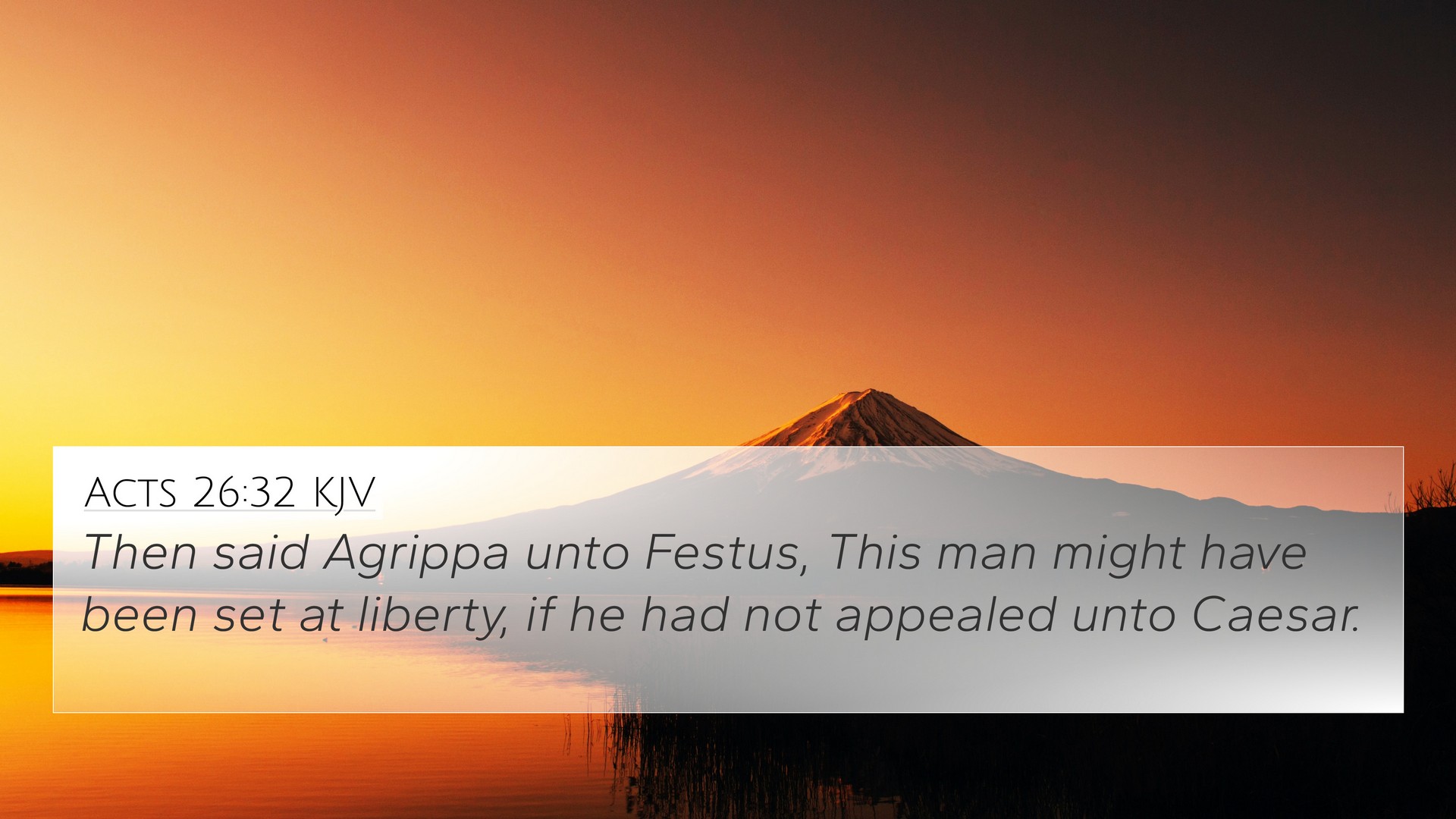Acts 26:32 states, "And Agrippa said to Festus, This man might have been set at liberty, if he had not appealed unto Caesar." This verse occurs at a pivotal moment in the narrative of the Apostle Paul's trial. In analyzing this passage, biblical commentators like Matthew Henry, Adam Clarke, and Albert Barnes provide insights into both the historical context and theological implications.
Contextual Background
- This verse concludes the trial of Paul before King Agrippa and Governor Festus, highlighting the political interplay between Roman authority and the burgeoning Christian faith.
- The appeal to Caesar is significant, positioning Paul within the legal framework of Roman justice, demonstrating his rights as a Roman citizen.
The Nature of Paul’s Appeal
- Matthew Henry emphasizes that Paul’s appeal to Caesar was both a strategic move and a matter of divine purpose, illustrating how God can work through seemingly restrictive means.
- Albert Barnes notes that Agrippa acknowledges the case against Paul was weak, indicating that had Paul not appealed, he could have been released, yet this too served God's plan for evangelism across the empire.
- Adam Clarke observes the irony that a man unjustly accused would find himself entangled in legal proceedings that ultimately fulfill his mission to bear witness to Christ in Rome.
Spiritual Insights
- The statement reflects the disarray and injustice often present in human judicial systems and the perseverance of the faithful amidst adversity.
- This moment serves as a reminder that God’s purposes may unfold through the realities of human decisions, as exhibited in Paul’s situation.
- The comment by Agrippa presents Paul’s demeanor as one of grace and purpose, showing the effectiveness of the Apostle’s witness even in chains.
Cross-References and Related Scriptures
- Acts 22:25-29 - Paul asserts his rights as a Roman citizen.
- Philippians 1:12-14 - Paul speaks about how his chains promoted the Gospel.
- Romans 8:28 - All things work together for good to those who love God.
- 2 Timothy 2:9 - Paul states he suffers trouble as an evildoer, yet the Word of God is not bound.
- Matthew 10:16 - Jesus instructs His followers on being wise as serpents and harmless as doves in the face of adversity.
- 1 Peter 4:12-14 - Encouragement regarding suffering for the faith.
- 1 Corinthians 9:1-2 - Paul defends his apostleship, showing his authority and rights.
- Acts 9:15 - God's intention for Paul to bear His name before nations and kings.
- Isaiah 43:2 - God’s promise of presence in trials which align with Paul’s circumstances.
- Acts 19:21 - Paul’s previous plans to go to Rome, showing God's guidance in his trials.
Thematic Connections
This verse provides rich material for thematic Bible verse connections that explore the sovereignty of God, the nature of justice, and the mission of the church amidst trials. The importance of cross-referencing Biblical texts reveals how themes of suffering, righteousness, and divine purpose connect across Scripture. For those interested in a comparative Bible verse analysis, studying Acts 26:32 is vital for understanding the apostolic mission and the early church's struggles.
Exploring Cross-References in Study
To deepen understanding and aid in study, tools for Bible cross-referencing such as a Bible concordance or a cross-reference Bible study guide can be invaluable for discovering how different scriptures converse with one another. When seeking to understand connections between Bible verses, look for keywords and concepts that resonate within the texts, thereby enriching personal study or sermon preparation.
Practical Application
When faced with challenges, one can reflect on Paul’s example to find hope and strength. His unwavering faith amidst legal and social opposition serves as a powerful reminder to maintain one's purpose and witness, no matter the circumstances.





